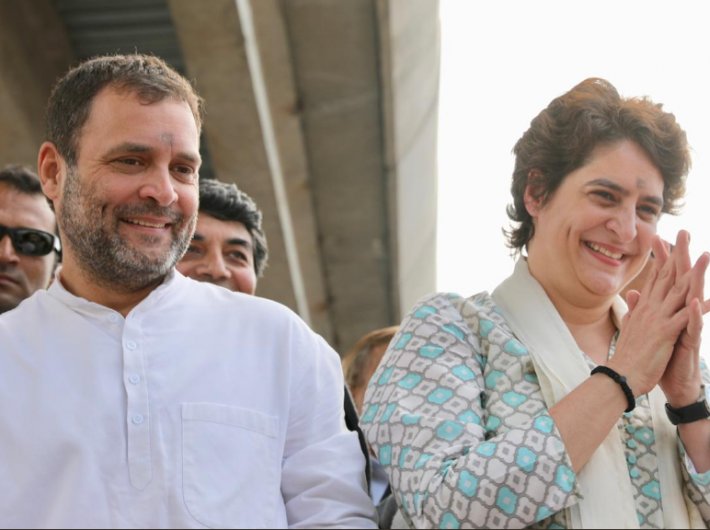The trouble with Priyanka’s Indira act: Today’s youth don’t remember even Rajiv, not to mention his mother
“Aandhi” (Storm), director Gulzar’s movie starring Suchitra Sen and Sanjeev Kumar, was made in 1975, when Indira Gandhi reigned supreme in Indian politics. The film, based on Kamleshwar’s Hindi novel ‘Kaali Aandhi’, depicted the life of a woman politician, and it was believed to be partly inspired by the life of the then prime minister. Suchitra Sen too apparently modelled her character on Indira in the way she spoke with authority to male colleagues or climbed on the stage with a sprint.
“Aandhi” obviously created a storm of controversy and could not be released till 1977 – only after Indira lifted the Emergency and was defeated in the elections. It did reflect a rather untouched theme of the 1970s politics, but few would recall that movie now to understand today’s politics. The political discourse has evolved around a new grammar; it has radically changed its axis.
Perhaps nostalgia is the last resort of a dying politics. The Congress seems to be doing exactly that in Uttar Pradesh. Those finding an uncanny resemblance between Indira Gandhi and Priyanka Gandhi Vadra and flaunting it as her political asset are literally clutching at straws in the face of a storm.
The argument that Priyanka would mobilise voters (60 percent of whom are below 35 years of age) on the basis of her facial resemblance to her grandmother is as absurd as it gets. It is almost 35 years since Indira was assassinated. The reality was that she was facing the worst crisis of her political career after Operation Blue Star and her political prospects were bleak when she was assassinated. Except for the groundswell of sympathy that electorally benefitted the Congress and her son Rajiv Gandhi in 1984 following the tragedy, Indira has hardly been a factor in any election since then.
In more than three decades after Indira’s demise, the country’s political landscape has grossly changed. In the two large states, Uttar Pradesh and Bihar, the Congress has been struggling hard to retain even the third position whereas in those days they were considered impregnable bastions of the Congress. Its regional leaders seemed invincible. In Uttar Pradesh, the party had stalwarts like Kamlapati Tripathi, Bir Bahadur Singh, VP Singh and ND Tiwari. The party’s state unit headquarters at Mall Avenue used to be a power hub parallel to the Lucknow secretariat, the seat of the government.
But all that grandeur of the past was of little relevance on February 11 when Priyanka along with her brother, Congress president Rahul Gandhi, staged a roadshow in Lucknow. Much of the crowd she attracted during her tour belonged to a generation who would scarcely relate to even Rajiv, not to mention Indira. Moreover, in the state, the Congress has been effectively marginalised since 1989. And there is no doubt that the three decades of consistent political marginalisation has debilitated the organisational strength of the oldest political party to mere rubble of what was once a magnificent palace.
Of course, there is a lot of scope for the Congress to rebuild and resurrect that structure. But that requires a great deal of perseverance and foresight. Take, for the example, the manner in which Priyanka carried out her roadshow and rushed back to be with her husband, Robert Vadra, who is facing an inquisition from the Enforcement Directorate (ED) is far too inadequate an exercise to inspire confidence among people about her sincerity. She is apparently planning to play the victim card, accuse the Narendra Modi regime of unleashing political vendetta and stand by Vadra. But she must realise her limitations.
It would be rather naïve to draw a parallel between Vadra’s case and Indira’s return to primacy after her botched-up arrest by the Janata Party government after the Emergency. Indira had inherited the legacy of her father, Jawaharlal Nehru, and emerged as a strong politician in her own right after 1966 by outmanoeuvring stalwarts like Morarji Desai, Nijlingappa and K Kamraj in 1971 by aligning herself with the poor and coining the slogan of ‘Garibi Hatao (banish poverty)’. Contrast this with the image of Priyanka standing by her husband accused of amassing wealth abroad, and you know the difference. Far from appearing like a tough and astute politician, she gives the impression of a harried housewife defending the indefensible shenanigans of her wayward husband. That imagery may evoke a degree of sympathy for her but remain bad politics.
If there is any scope for Priyanka to make an impact in Uttar Pradesh, she would do well to cast aside the hangover of the past. She is not Indira. And in politics personalities rise and fade away with the passage of time and then remain relevant only for history. She may benefit from her background and the glamour quotient associated with it to hog the limelight. But that is hardly an index of her political acceptability as a leader.
This comment has appeared on FirstPost.com

